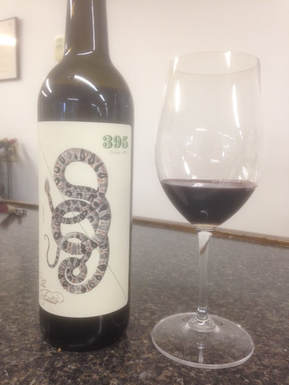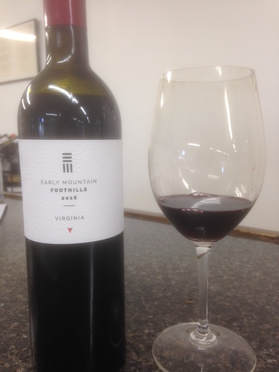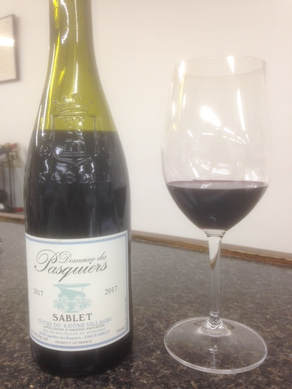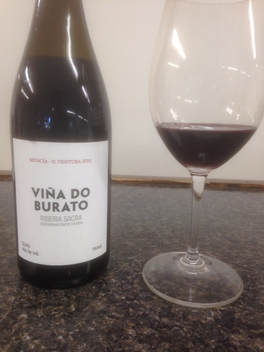 All too often Merlot gets the short end of the winemaking stick, and its reputation has suffered in the minds of many consumers. When grown side by side with Cabernet Sauvignon, Merlot will produce grapes that naturally end up making a softer, less tannic wine. Not a better or worse thing, just how they are different. Also why they work so well in tandem throughout Bordeaux, one bringing some firmness and spine to the Merlot, while the other softens out the rough edges in Cabernet Sauvignon. But in the modern and often mass marketed version of the grape, the softness gets taken to extreme, stripping it of any texture or character. In many circles the name Merlot has become a buzz word for a red wine built for people that otherwise don't like red wines. Thankfully more and more producers are working to bring a little pride back to this variety. The Fableist label is a collaboration between two Paso Robles winemakers and friends looking to create some value oriented everyday wines using their many vineyard connections, all the while not infringing with the wines that make up their daytime jobs at Sans Liege and Field Recordings wineries. Deep, dark color in the glass with equally dark aromatics, this is obviously from the first whiff NOT a shy or timid Merlot. Dark currants, black cherries, and just a touch of toasty oak that disappears over time as the fruit comes more present. On the palate the fruit is mouth-coating and rich, full of the dark fruits from the nose, but doesn't loose the classic Merlot powder fine tannins, nor does it finish with any sweetness that often masquerades as richness. This is a wine built to be at home with pretty much any dish you would think to have a Cabernet Sauvignon with, yet still polished enough to also be a glass by itself to wind down an evening. An all purpose Merlot the way it SHOULD be.
0 Comments
 If you weren't going to be able to make it in to the store on Saturday for the special Early Mountain tasting, we wanted to at least lure you in by giving everyone a taste of what you were missing. But if you can make it Saturday as well, you really owe it to yourself to try and make that tasting too if you're a Virginia wine fan. Or even just a fan of great wine in general, because what Early Mountain is achieving with their wine program is genuinely elevating Virginia wines to levels of quality not seen here on a regular basis. There aren't a lot of great sites yet in Virginia, nor that many truly great wines that achieve a high level year after year. Barboursville 'Octagon', Linden 'Hardscrabble' red and Chardonnay, and the RdV series of Cabernet Sauvignons are examples of wines that have set a repeatedly high bar for success. Judging by recent reviews in the Wine Advocate they are worthy of ratings among th better wines from the wine world's elite. Now that Early Mountain own and manage the Quaker Run vineyard, their wines from that site are quickly being recognized as worthy of joining those few elite wines. Their single vineyard wines from the site have all been well received in previous vintages, and 'Rise' is built from their best lots of fruit and only from great vintages. While the Vidal Blanc, Quaker Run Chardonnay, and Foothills Red would make for a fine tasting on their own, the opportunity to taste Rise is truly special if you can make it. If not, getting a great deal on their Foothills red today and tomorrow isn't too shabby either. Built from a mix of Merlot, Petit Verdot, Syrah, Cabernet Franc, Cabernet Sauvignon, Tannat, and even a splash of the white grape Petit Manseng, Foothills is all about easy drinking. Deep plum and cherry fruit aromas pop from the glass, and knowing that there is some Petit Manseng in the mix make it easier to place the hints of unexpected citrus and white flowers just behind everything else. The palate is full and easy with soft tannins that only poke through at the finish to bring out a hint of cocoa tones behind the core of dark fruits. Often Virginia wines can be faulted for a lack of body and fruit when trying to make more value oriented wines, but this has always succeeded at delivering that quality even in a trickier vintage like 2016. Definitely a wine to take to friends and let them see how much Virginia wines have grown.  Many of you may wonder about the quality of such a young Cotes du Rhone, thinking that it's being released so shortly after harvest that it's a light or limited wine. Much like the Joncier Cotes du Rhone in our Select Six this month, this is more about a shift in style for more Rhone producers to a less extracted style that needs oak aging and longer to evolve. This is a style becoming more popular among producers that take a 'natural' winemaking approach looking for a more transparent presentation that allows the unique native yeast flavors to show through. While not 'Full Natural', the Domaine has embraced many of the organic/Biodynamic principles, especially since brothers Jean-Claude and Philippe took over. Just because this was built to be enjoyed young, do NOT be fooled into expecting a fruity wine without substance. Intense blueberry and currant fruit aromas emerge early with more subtle flowers and graphite showing as it opens up, both pretty and serious at the same time. The palate shows off the natural weight of the wine from being bottles quickly with minimal filtration, deep with savory currant flavors and an unsweetened richness that really allows the iron-tinged minerality to come through on the finish. This is definitively a step away from the big fruit style of many Cotes du Rhones, which is exciting to see the exploration of different wine interpretations for a region of such volume. A great wine to match with peppery red meats with lots of char.  While Mencia may not be one of the more household names in wine, it's an important variety in Spain's winemaking history and evolution. Prevalent in the Northwestern corner of the country, Mencia reaches its best expressions in both the Castilian region of Bierzo and the Galician region of Ribiera Sacra. In the modern area Bierzo became more noted first due to several famous producers making new investments and creating new interest in the variety in the early 2000s. Bierzo's style with Mencia is richer, bolder and more intensive thanks to the warmer climate of Old Castile, while Ribiera Sacra is cooler from the higher altitude in the mountains. The Ribiera Sacra wines have grown in popularity in recent years as the market has developed for lower alcohol, less aggressively oaked wines, as well as the attention for smaller, more 'natural style wines. D. Ventura is a family run producer making a variety of wines from family holdings in the region, with Vino do Burato made from a single site in one of the more lush and rainy climates. The fruit tends to be slower to ripen here, so their style of wine is meant to be fresher and more elegant. There was a theory at one time that Mencia was in some way a genetic predecessor to Cabernet Franc in Bordeaux, and when tasting a wine like this the comparison make a lot of sense. Pretty violets and cool cherry skin aromas on the elegant nose, which shows more currants and dark savory spices at it opens up. Silky, snappy cherry skin fruit with an almost citrusy zest to the almost tannin-less finish. This compares more to a Loire style wine than most Spanish ones, vibrant and lively without a thick feel on the palate, great with your more subtle beef and pork dishes that may use more vinegar and herbs in their preparations. |
The Best of the Best.We offering free tastings on these wines in the store every Thursday and Friday, and a 10% discount off the retail price through the duration of the day. Come on by and give them a try! Archives
July 2024
Categories |
Location |
|

 RSS Feed
RSS Feed